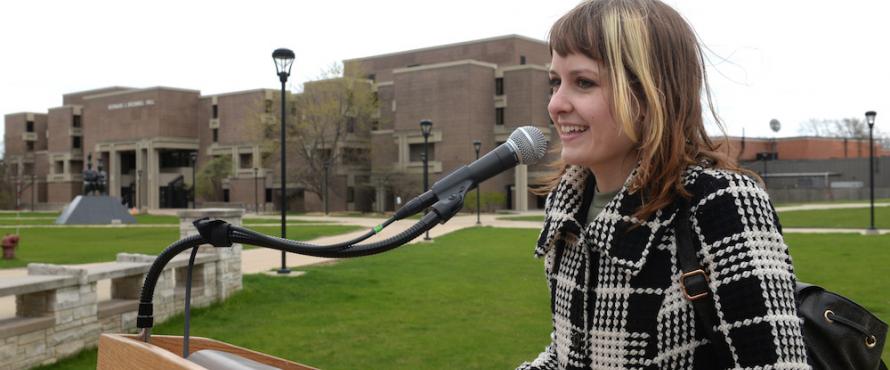Anett Zlotorzycki is the chair of the Green Fee Committee and member of the Green Conservation Group at Northeastern Illinois University. We asked Zlotorzycki, a double major in Geography and Environmental Studies, a few questions about green efforts, the green fee and her personal investment.
Why should students, specifically at Northeastern, care about green efforts?
Students at Northeastern should care about green efforts because the environment affects their lives on a daily basis. Healthy air, water and soil help foster a healthy body and well being of an individual. Also, everyone can do their part to help decrease water and energy use in whatever job they get or in any setting they are in.
Reducing their consumption across the board is another way that actually saves money as well as decreasing harmful pollutants. Realistically, we cannot afford to continue on a wasteful and polluting path, but there are many solution-based answers. It’s a community effort to look out for ourselves and the other species that share this wonderful planet with us.
Everyone—no matter their major or field of work—can bring policy change or habitual environmentally friendly practices into their workplace by speaking up and being a good role model.
At monthly meetings, the Green Fee Committee aims to incorporate and help fund initiatives that reduce energy, water usage and waste on campus—something everyone can be a part of on a small scale or large scale.
Why are you personally motivated to help in this area?
I get to be involved with something that is extremely important for the future of the University and the world as a whole. I truly feel happier, more fulfilled and get a greater sense of community by being involved in the Green Fee Committee.
Voting to fund renewable energy projects such as the solar panels on Building B is part of my responsibility as an individual and as a student. My motivation comes from feeling saddened and reading the research about how destructive and polluting oil, coal and natural gas extraction is to ecosystems and human health.
Also, knowing about the contaminating practices of large-scale factory farm food production makes me happy that Northeastern has incorporated a community garden on the Main Campus that promotes local healthy living.
What are you most proud of in terms of what NEIU has been able to accomplish so far?
I am proud of Northeastern’s Green Fee Committee in many ways. We have voted to pass great proposals brought by the students, faculty and staff, including solar panels on Building B and the pool roof, tree planting, bike racks, a bike repair station, an electric car for the Parking Office, recycling bins, more LED light bulbs, filtered water bottle filling stations, bird collision safe window treatment, and more. We look forward to continuing on the path of making Northeastern more green.
How do you think students perceive the green fee?
Students may perceive the Green Fee in various ways. Some may not know why there is a Green Fee or where it’s going. Some people may not know there is even a Green Fee Committee on campus. But those who do know about the green fee and the committee are thankful that it exists.
Students have come to our meetings and brought proposals and helpful advice for improving environmental initiatives. There is still a lack of awareness and education on the importance of environmental efforts, but that is changing. Students are also understanding that environmentalism can be brought in various ways such as policy changes, being a good role model, inspiring others to think holistically about nature, more funding for energy and water efficient projects, and the daily choices we all make.
I would still like others to understand more of what the Green Fee Committee does and how willing we are to hear from more students, faculty and staff on campus. This committee was created for the community to attend the meetings, bring advice, and bring proposals to help make the community more nature-oriented.
What Northeastern can do on a small scale will create a chain reaction of positive behaviors nationally and beyond. It is important for people to remind themselves that looking out for a university community involves looking out for the natural ecosystem that supports the life on campus.








